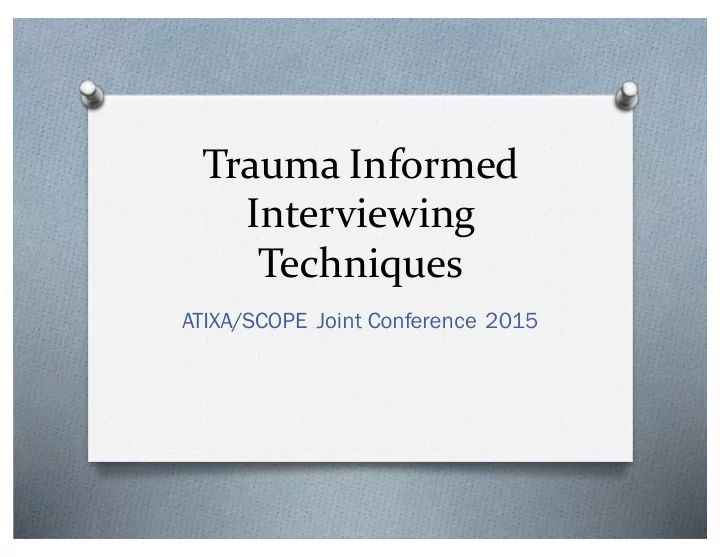

Trauma&Informed& Interviewing& Techniques ATIXA/SCOPE Joint Conference 2015
Content&Warning O Talking about trauma stirs up trauma (personal and secondary) O The terms victim and survivor will be used interchangeably. That is not to say that every victim identifies as or has the opportunity to be a survivor. O When discussing reports I will most likely say “alleged victim”.
Trauma&Informed&Means& O You recognize the myriad ways trauma can be experienced- and you respect that O You are prepared for the needs of a traumatized person O You ask questions strategically and transparently
You&recognize&the&myriad&ways& trauma&can&be&experienced an and you respect it it
Bu Bullying TRAUMA Military Tra Mi rauma Vi Victim or Witness to Domestic Vi Violence Sexual Abuse or As Se Assault Ne Neglect Physical Abuse or As Ph Assault Em Emotional Abuse or Psychological Maltreatment Natural or or Manmade Disasters School ool Viol olence Seriou ous Accident, Illness, or or Medical Proc ocedure For orced Displacement Traumatic Grief or or Separation on War, Terror orism, or or Pol olitical Viol olence Victim or or Witness to o Com ommunity Viol olence
The&Trauma&We&Don’t& Talk&About O Hi Historical Trauma O Ge Gender Norming Trau auma O Sy System-In Induced Trauma and Re Re-Tr Traumatization
You&are&prepared&for&the&needs& of&a&traumatized&person
PR PROBLEM SOLVING Se Security SU SURVIVING https://www.linkedin.com/pulse/millennials-maslows-hierarchy-needs-matthew-larsen-morava
Crisis&vs.&Strategy O We often do our work running from one crisis to the next O Trauma-Informed means you’re the one thinking ahead since the alleged victim won’t/can’t O What Would Maslow Do?
Reduce&Opportunity&for&Guilt O Victim blaming (self and community) means a victim may struggle to tell you what they need because they feel selfish asking O The mind in crisis may not be able to fully explain what it needs to feel safe O Plan out the basics so they don’t have to ask
Your&Space O High traffic? O Keurig is your friend O Easy O Texture entrance/exit? O Smell O Accessible? O Light O Privacy
YOU O How do you present (clothing, demeanor) O Compared to others in the institution? O Your perception vs. their reality O Who is your focus?
You&ask&questions&strategically& and&transparently
First&Impressions O Trauma-informed questions are ineffective if your first impression was not trauma- informed O Initial Contact Letters: K-I-S-S O How in control of the process are they really ? (Victims can smell a lie.)
Needs&vs.&Want O Starting out, focus on what you need vs. what you want O You’re building trust O Give people time to process everything O Small chunks
Transparency O Tell them tough stuff before you get started: O You will need to ask detailed questions. O You will need to clarify slang terms or vague statements O You may need to ask “devil’s advocate” questions O You may need to push back if something doesn’t add up O Explain why you need to do the tough stuff O Explain that they can’t “fail” at this
NonLVerbal&Cues O Times to slow down: O Physically closed off O Won’t make eye contact O Change in tone O Shift the kinds of questions O Talk about interim measures O Bring in an advocate O If you have enough for the moment, end the session
Asking&Questions O Open ended O They are your expert in that moment. Tell them that. O When using open-ended questions, the control of the conversation switches over to the person being asked the question O Save technical questions for the end when open-ended is exhausted. O “Tell me more about”, “I’d like to go back to when you said…”
The&Accused&Person O If you do these things for the accused person, you often get a better response O They may be scared. O They may have their own trauma that is being triggered by this experience O If a Complainant expresses they care about the accused’s well-being, you can talk about how you respect them. It builds trust.
Vicarious&Trauma&&& Compassion&Fatigue O Hearing these stories is not easy O You start to hear the commonality, which makes it feel exhausting to listen to the “same story” over and over O You have too many cases, so you try to speed things up wherever you can
Trauma&Informed&Means Every time someone reports a Title IX issue to you they are telling you: “Someone took my control away.” We facilitate empowerment. How ow can I help you ou be safe? How ow can I help you ou stay successful?
Than ank you! Jyl Shaffer (503) 201-5597 jylshaffer@gmail.com Twitter: jylshaffer jyl.shaffer@uc.edu (513) 556-3349
Recommend
More recommend